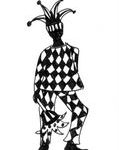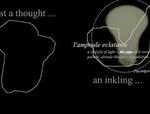Beyond the String of Beads: More Systems for Game Narrative
Monica EvansMonica Evans extends Costikyan's analysis of the narrative/game debate, but ultimately concludes that battles over genre categorization miss the point of electronic media, and that we cannot yet accurately assess how the tension between story and play works out because digital games are "products of a technology still in its infancy."
On Twelve Easy Lessons to Better Time Travel
Mark C. Marino
Mark Marino explains Twelve Easy Lessons to Better Time Travel as an allegory of electronic writing, featuring characters that represent salient figures from Alan Turing to Shelley Jackson.
On Juvenate
Marie-Laure Ryan
Marie-Laure Ryan describes Juvenate as an audiovisual hypertext that can be navigated via a provided map or wandered through like a maze, evoking the question of whether the text is best understood as a narrative or a game.
Parasitic Fiction
Stephen J. BurnStephen Burn considers Tom LeClair's recent novel through the lens of the latter's own critical work on postmodern fiction, while also excavating the novel's relation to Faulkner's tale of racial empire building, Absalom, Absalom!
Electronic Media, Identity Politics, and the Rhetoric of Obsolescence
Anthony EnnsAnthony Enns questions Kathleen Fitzpatrick's link between an anxiety about the displacement of male privilige and the fear of new media technology in postmodern fiction.
Home: A Conversation with Richard Powers and Tom LeClair
Scott HermansonScott Hermanson presents a dialogue he conducted with novelists Richard Powers and Tom LeClair, at the University of Cincinnati in 2005. Moderated by Hermanson, the novelists discuss the intricacies of writing about nature, the role of history in the novel, and their fictions' use of imitative form.
The Creation of Floyd the Robot in Planetfall
Steve MeretzkySteve Meretzky reflects on one of the earliest (1982) NPCs (non-player characters) to evoke an emotional investment from videogame players. Meretzky draws attention to the fact that character development - integral to fiction and film - is not often emphasized in game design.
On Savoir-Faire
Emily ShortEmily Short explains that one of the goals of Savoir-Faire is to teach the player to become a magician. This pedagogical orientation means that - in contrast to interactive fictions that allow only a severely limited range of player input - Short's game rewards undirected play because the player is not only solving puzzles, but also learning.
On Soft Cinema: Mission to Earth
Lev Manovich
Lev Manovich describes a filmic methodology for the information age: narratives structured on the logic of databases. The delegation of a large part of the editing Mission to Earth to a computer results in a product that is "between narrative and a search engine."
Nothing Lasts
Stephen SchryerIn "Nothing Lasts," Stephen Schryer considers Tom LeClair's Passing On and The Liquidators as paired novels, one immersing the reader in the maelstrom of the social and economic systems that shape contemporary life, the other shielding the reader from those systems. Unlike the massive novels from the seventies that fascinated LeClair the critic, Schryer finds the novelist a "literary miniaturist," seeking "concise synecdoches for the larger systems" his books evoke.
On Solitaire
Helen Thorington
Helen Thorington describes Solitaire, a program for generating fiction in the same line as the projects explained by Chris Crawford and D. Fox Harrell elsewhere in this thread.
Pax, Writing, and Change
Stuart Moulthrop
Stuart Moulthrop argues that Pax answers John Cayley's question, "What would textual instruments look like?" Moulthrop maintains that one plays this electronic text (in the manner of a musical instrument) as much as one reads it.
